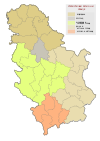Ada, Serbia
Ada
| |
|---|---|
Town and municipality | |
 Catholic Church in Ada | |
 Location of Ada within Serbia | |
| Coordinates: 45°48′N 20°08′E / 45.800°N 20.133°E | |
| Country | |
| Province | |
| District | North Banat |
| Government | |
| • Mayor | Zoltán Bilicki (SNS) |
| Area | |
| • Ada | 228.6 km2 (88.26 sq mi) |
| Elevation | 83 m (272 ft) |
| Population (2022)[1] | |
| • Ada | 7,423 |
| • Metro | 13,293 |
| Time zone | UTC+1 (CET) |
| • Summer (DST) | UTC+2 (CEST) |
| Postal code | 24430 |
| Area code | +381(0)24 |
| Car plates | SA |
| Website | www |

Ada (Serbian Cyrillic: Ада; Hungarian: Ada) is a town and municipality located in the North Banat District of the autonomous province of Vojvodina, Serbia. It is situated near the river Tisa in the geographical region of Bačka. The town has a population of 7,423, while the municipality has 13,293 inhabitants (2022 census), and a 72.71% Hungarian majority.[2]
The municipality of Ada includes the towns of Ada (the seat) and nearby Mol, and the villages of Utrine, Obornjača and Sterijino.
Name
[edit]The name of the town comes from the Serbo-Croatian àda which means an island in a river or lake.[3]
Demographics
[edit]| Year | Pop. | ±% p.a. |
|---|---|---|
| 1948 | 22,235 | — |
| 1953 | 21,676 | −0.51% |
| 1961 | 22,234 | +0.32% |
| 1971 | 22,611 | +0.17% |
| 1981 | 22,408 | −0.09% |
| 1991 | 21,506 | −0.41% |
| 2002 | 18,994 | −1.12% |
| 2011 | 16,991 | −1.23% |
| 2022 | 13,293 | −2.21% |
| Source: [4] | ||
According to the 2011 census, the total population of the Ada municipality was 16,991 inhabitants.
Ethnic groups
[edit]All local communities in the municipality have a Hungarian majority.
The ethnic composition of the municipality is:[5]
| Ethnic group | Population | % |
|---|---|---|
| Hungarians | 12,750 | 75.04% |
| Serbs | 2,956 | 17.40% |
| Roma | 323 | 1.90% |
| Yugoslavs | 74 | 0.44% |
| Croats | 50 | 0.29% |
| Albanians | 25 | 0.15% |
| Slovaks | 18 | 0.11% |
| Others | 795 | 4.68% |
| Total | 16,991 |
Jewish history
[edit]This section needs additional citations for verification. (May 2022) |
A Jewish community was founded in the city in 1790. Over the years, pogroms, assaults and murders against them against the background of anti-Semitism were carried out.
The first rabbi of the city was Rabbi Aharon Ackerman, followed by Rabbi Yaakov Heilbronn, who was murdered by rioters. In 1880, 410 Jews lived in the community and in 1896 a synagogue was established. In 1925, 470 Jews lived in the town.
In April 1941, Nazi Germany invaded the area and 60 Jews were murdered. Most of the community's Jews were later murdered in the Holocaust. 59 survivors immigrated to Israel in 1948 and in 1973 the synagogue was demolished by order of the Yugoslavian authorities.[6]
Economy
[edit]The following table gives a preview of total number of registered people employed in legal entities per their core activity (as of 2018):[7]
| Activity | Total |
|---|---|
| Agriculture, forestry and fishing | 16 |
| Mining and quarrying | - |
| Manufacturing | 2,341 |
| Electricity, gas, steam and air conditioning supply | 5 |
| Water supply; sewerage, waste management and remediation activities | 29 |
| Construction | 83 |
| Wholesale and retail trade, repair of motor vehicles and motorcycles | 658 |
| Transportation and storage | 139 |
| Accommodation and food services | 91 |
| Information and communication | 53 |
| Financial and insurance activities | 40 |
| Real estate activities | 2 |
| Professional, scientific and technical activities | 114 |
| Administrative and support service activities | 45 |
| Public administration and defense; compulsory social security | 151 |
| Education | 261 |
| Human health and social work activities | 234 |
| Arts, entertainment and recreation | 31 |
| Other service activities | 80 |
| Individual agricultural workers | 349 |
| Total | 4,722 |
Notable people
[edit]- Mátyás Rákosi (1892–1971), Hungarian communist leader
- Arpad Sterbik (born 1979), Yugoslav and Spanish handball goalkeeper
International relations
[edit]Twin towns — Sister cities
[edit]Ada is twinned with:
See also
[edit]- List of places in Serbia
- List of cities, towns and villages in Vojvodina
- List of Hungarian communities in Vojvodina
References
[edit]- ^ "Census 2022: Total population, by municipalities and cities". popis2022.stat.gov.rs.
- ^ "Census 2022 - excel table | ABOUT CENSUS". popis2022.stat.gov.rs. Retrieved 2024-10-25.
- ^ Kiss, Lajos (1980). Földrajzi nevek etimológiai szótára. Budapest: Akadémiai Kiadó. ISBN 963-05-2277-2.
- ^ "2011 Census of Population, Households and Dwellings in the Republic of Serbia" (PDF). stat.gov.rs. Statistical Office of the Republic of Serbia. Retrieved 19 March 2017.
- ^ "Попис становништва, домаћинстава и станова 2011. у Републици Србији" (PDF). stat.gov.rs. Republički zavod za statistiku. Retrieved 6 April 2019.
- ^ Ada community in JewishGen Communities Database
- ^ "MUNICIPALITIES AND REGIONS OF THE REPUBLIC OF SERBIA, 2019" (PDF). stat.gov.rs. Statistical Office of the Republic of Serbia. 25 December 2019. Retrieved 29 December 2019.
- ^ "Újbuda története" [Újbuda - New in History, Twin Towns]. Rafia.hu (in Hungarian). Archived from the original on 2013-05-21. Retrieved 2013-08-11.
External links
[edit]- Official website
- History of Ada (in Hungarian)




